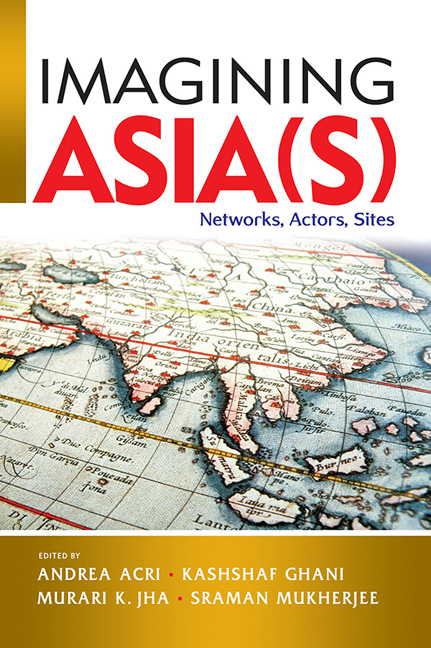Book contents
- Frontmatter
- Contents
- List of Contributors
- Introduction
- Part I Conceptualizing the Region: Past and Present
- Part II Conceptualizing Asia through the Prism of Europe
- 4 In Pursuit of Knowledge from Asia: François Valentijn on the Hindu Social Divisions in the Coromandel Region, c. Seventeenth–Eighteenth Century
- 5 British Romantic Poetics and the Idea of Asia
- Part III Networks of Knowledge Across the Indian Ocean
- Part IV Histories and Geographies of Pilgrimage in Asia
- Part V Trans-Local Dynamics and Intra-Asian Connections across Space and Time
- Index
5 - British Romantic Poetics and the Idea of Asia
from Part II - Conceptualizing Asia through the Prism of Europe
Published online by Cambridge University Press: 31 January 2020
- Frontmatter
- Contents
- List of Contributors
- Introduction
- Part I Conceptualizing the Region: Past and Present
- Part II Conceptualizing Asia through the Prism of Europe
- 4 In Pursuit of Knowledge from Asia: François Valentijn on the Hindu Social Divisions in the Coromandel Region, c. Seventeenth–Eighteenth Century
- 5 British Romantic Poetics and the Idea of Asia
- Part III Networks of Knowledge Across the Indian Ocean
- Part IV Histories and Geographies of Pilgrimage in Asia
- Part V Trans-Local Dynamics and Intra-Asian Connections across Space and Time
- Index
Summary
European colonialism, embedded in the values of early capitalism, was, as we well know today, the fecund breeding ground of what was named as Orientalism, the obverse image of all that was then necessarily defined as the Occidental. This historical shift that began in the late seventeenth century gathered momentum in the eighteenth century and came to its fullness in the nineteenth century, forming a long and complex cultural, political, economic, and psychological narrative. This multilayered, multicultural, mixed race account still shapes the ways in which the new global order responds even in the twenty-first century. While initially it was the German and French orientalists who awoke to the “discovery” of new Asian civilizations with rich ancient cultures and traditions, ultimately it was the British colonialists with their army of erudite bureaucrats, lawmakers, and savants who were most successful in “translating” Asia and exporting it back to their mother country—a country soon to be named as Great Britain—from the Asian colonies. Among other modes they did this through lithographs and watercolours; poems, plays and novels; language, script, material objects, and ideas.
Eighteenth-century England, with its vast sweeping changes brought upon by the bloodless Glorious Revolution of 1688 altered forever the relationship between the British sovereign and the British people and became the natural breeding ground for this intercultural transfer. In consequence, in the “long eighteenth century” (thus named by literary critics), there were now present newly awakened republican subjects with a sense of their own individual worth. A populace living in hamlet, village, county, and increasingly in freshly industrialized towns, who were slowly discarding what the poet William Blake would famously describe as their “mind forg'd manacles.” This spirit of libertarianism was fuelled by the increasing literacy that, in turn, led subjects to think about themselves in novel ways. The question “Who am I?” could no longer be answered in terms of the former Elizabethan “Great Chain of Being” where, for centuries, a person was cast in the smithy of an iron class demography, a system as old as the history of the founding of feudal Britain itself.
- Type
- Chapter
- Information
- Imagining Asia(s)Networks, Actors, Sites, pp. 125 - 144Publisher: ISEAS–Yusof Ishak InstitutePrint publication year: 2019

